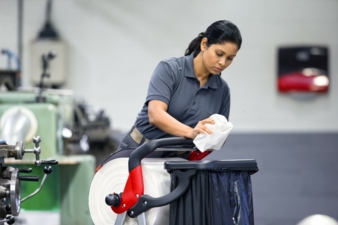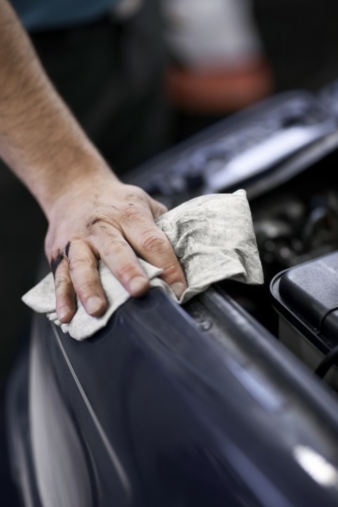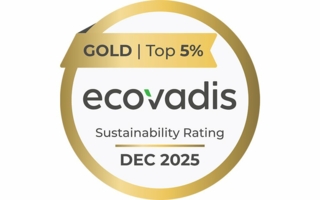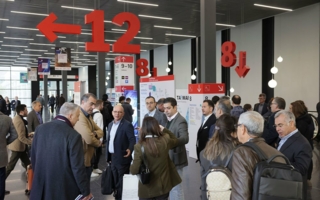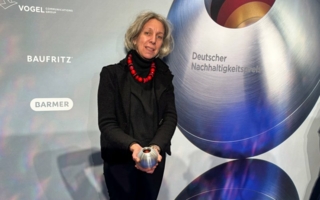28/05/2015 — auf Deutsch lesen
Nonwoven cloths: Reduce waste and handling cost by up to 80%!
New study shows the benefits of replacing old rags and rental cloths with modern wipes.
In manufacturing industries where productivity is key, traditional solutions for wiping and cleaning such as textile rags and rental cloths are not specifically made for that task. Newer nonwoven products on the market, offer enhanced properties. To compare the performance between rags, rental cloths and nonwoven products, an independent research institute has carried out product tests. Results shows a number of advantages for nonwoven products compared to rags and rental cloths – for example 32% less time and 40% less solvent required to get the job done.
Today’s modern machineries have replaced yesterday’s tools. But in other instances, old solutions tend to linger on as textile rags and rental cloths are still used for wiping and cleaning in many factories, based on old habits. However, whilst machinery has improved, so have wiping and cleaning products. To compare performance and end-results, a third party research institute has performed tests between textile cloths, rental rags and new wiping products from Tork, based on new technology and nonwoven fibers. The results shows several benefits of the nonwoven products in comparison, such as less time required to achieve the same results and considerably less solvent required.
Examples from the test results:
• Up to 41 % less solvents: The nonwoven products required considerably less solvent to do the job compared to the solvent needed to clean with rags and rental cloths. • Up to 35 % less time: The performance of the nonwoven products enabled to get cleaning and wiping tasks much faster compared to rags and rental cloths. • Up to 31 % less effort: The nonwoven products were perceived to require substantially less effort to get the same job done. • Up to 80 % less waste and handling cost: Nonwoven products weigh less and take up less space than rags, which makes it more effective to handle and transport. • Takes up less space when transporting and storing: Rags take up to 4,5 times more space than the nonwoven products.
One factory that has made the shift from textile products to nonwoven products is Trioplast’s factory in Sundsvall, Sweden. Trioplast is one of Europe's largest plastics producers with a dozen factories in several countries. When looking over expenses for using textile cleaning-products, seeing the actual cost for transportation, destruction and the amount of solvents being used, Trioplast started looking for other options.
"The nonwoven products we use from Tork have reduced our cost of handling and destructing our previous wiping and cleaning material by 75%. On top of that, we have also reduced our consumption of solvents", says Patrik Eriksson, Production Manager, Trioplast Sundsvall.
Aside from the financial benefits, the shift to nonwoven products had several environmental benefits. When looking at the whole life cycle of the Tork products compared to the previous rags and rental cloths, it became clear that the shift reduced their environmental impact – thanks to reduced consumption, use of solvents and transportation needs. In addition, the new products also had a positive effect on the working environment – by helping the staff save valuable time and effort in keeping each workstation tidy - a prerequisite for smooth operations.
About nonwoven Nonwoven is manufactured from natural and/or man-made fibers (e.g. cotton/pulp and synthetic fibers). Regardless of the combination of fibers, nonwoven is always manufactured in a two-step process - including a formation step where fibers form a web and a boding step where the fibers are fixed together. By using different fibers as well as different formation and bonding processes unique capabilities can be created, optimized for different applications. All Tork nonwoven products are purpose made for the tasks that they are supposed to be used for. For example, Tork nonwoven products designed for industry wiping and cleaning tasks, feature a combination of absorbency, strength and low lint properties. Nonwoven technology is also used in products such as filters, sound isolators and surface materials in diapers and in feminine care products.
About the product testing and results The testing was carried out in Sweden by Swerea Research Institute, in 2014. The main focus of the test was to evaluate products being used for wiping and cleaning within manufacturing industries – including rental cloths, rags and nonwoven cloths. Two tests were carried out to replicate tough work situations and to grade performance between the products.
• Test one: Removing paint that had dried for 4 minutes from a metal surface 60 x 90 cm with the aid of a solvent, white spirit. The paint, alkyd based primer, was applied by a roller. Panel participants started off by using 10 ml solvent and were able to add more solvent into the cloth in steps of 5 ml per occasion. Through the test the time and use of solvents used to remove the paint was measured and compared between cotton rags, mixed rags, rental cloths and Tork Heavy-Duty Cleaning Cloths.
• Test two: Removing 10 g of a mix of asphalt 2/3 and grease 1/3 that had dried for 1 hour, from a metal surface 60 x 90 cm with the aid of a degreaser, CRC brake degreaser. After the task, panel participants were asked to evaluate the effort/work needed on a 1–4 scale with perceived effort being; 1) very easy, 2) easy, 3) tough, 4) very tough. Cotton rags, mixed rags and rental cloths were compared to Tork Heavy Duty Cleaning Cloths and Tork Industrial Heavy-Duty Cleaning Cloths.
About Tork The Tork brand offers professional hygiene products and services to customers ranging from restaurants and healthcare facilities to offices, schools and industries. Products include dispensers, paper towels, toilet tissue, soap, napkins, and industrial and kitchen wipers. Through expertise in hygiene, functional design and sustainability, Tork has become a market leader. Tork is a global brand of SCA, and a committed partner to customers in over 80 countries. www.sca-tork.com.
About SCA SCA is a leading global hygiene and forest products company. The Group develops ?and produces sustainable personal care, tissue and forest products. Sales are ?conducted in about 100 countries under many strong brands, including the leading ?global brands TENA and Tork, and regional brands, such as Libero, Libresse, Lotus, Nosotras, Saba, Tempo and Vinda. As Europe’s largest private forest owner, SCA?places considerable emphasis on sustainable forest management. The Group has ?about 44,000 employees. Sales in 2014 amounted to approximately SEK 104bn (EUR 11.4bn). SCA was founded in 1929, has its headquarters in Stockholm, ?Sweden, and is listed on NASDAQ OMX Stockholm. For more information, visit ?www.sca.com.

